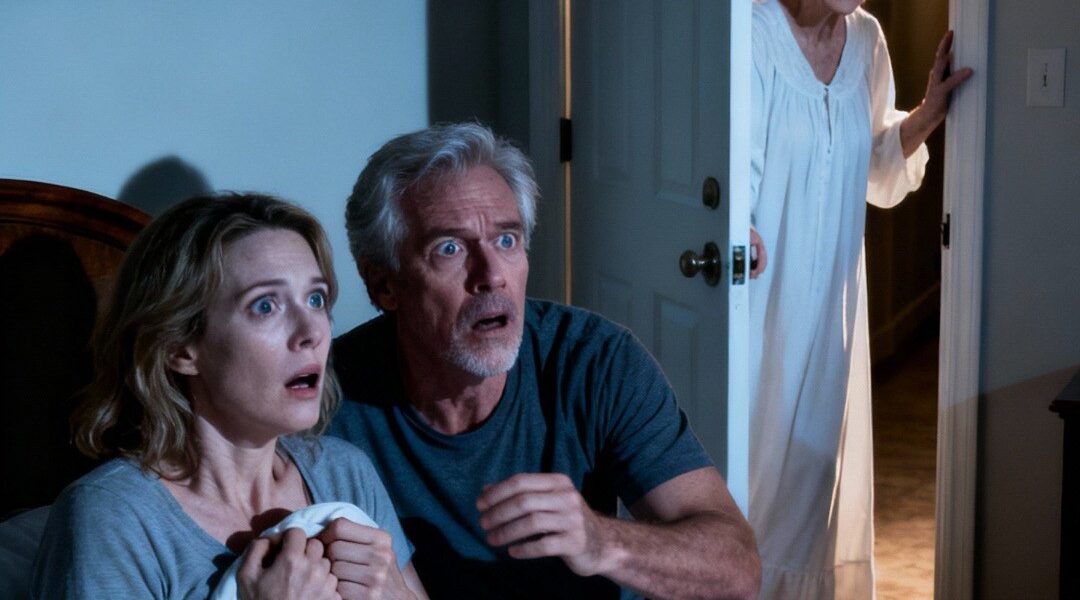When I married Liam, I thought the hardest adjustment would be learning his favorite brand of coffee or his habit of leaving socks on the couch. I didn’t expect the problem to arrive at 3 a.m. every single night. At first, the sound was small — three light taps on our bedroom door. Knock. Knock. Knock. Barely enough to stir the air, but sharp enough to wake me. The first time it happened, I thought maybe it was the house settling, or the pipes sighing through the cold. But the second night, it came again — same rhythm, same hour. And when I crept out into the hall, the light was low, the air still, and no one was there. Liam mumbled something about his mother’s insomnia, saying she “sometimes wandered,” but the way he said it — too quickly, without meeting my eyes — only made me more uneasy.
Weeks passed, and so did my sleep. Every night, the same ritual: the tapping, the whisper of slippers in the hallway, the dread pressing down on my chest. Finally, curiosity overpowered fear. I bought a small camera, the kind you can hide above a doorframe, and set it up before bed. Liam didn’t know — I didn’t want to feed his insistence that I was “imagining things.” The next morning, I pressed play. The footage flickered to life, and there she was — Margaret, my mother-in-law, her white nightgown swaying like a ghost’s breath. She stopped in front of our door, glanced around, then knocked three times. For ten whole minutes she stood there, still as a statue, her face vacant and strange, her eyes fixed on something unseen. Then she turned, slowly, and walked away. When I showed Liam, the color drained from his face. He looked terrified — but not surprised.
That afternoon, I confronted Margaret directly. She didn’t deny it; she only asked, almost mockingly, “What do you think I’m doing?” Then she left the room as though she hadn’t just shaken the ground beneath me. That night, I watched more footage. After the knocks, she pulled out a small silver key, pressed it gently against our lock, and whispered something I couldn’t hear. It wasn’t until I found Liam’s old notebook that the truth began to surface. His handwriting trembled across the page: “Mom still checks the doors every night. Says she hears him outside. Says I’m in danger.” When I showed him, he broke down. The story spilled out — his father had died in a break-in when Liam was a child. Margaret had been the one to find him. Ever since, she’d lived with the haunting belief that the intruder would one day return.
A psychiatrist confirmed what fear had twisted: Margaret wasn’t malicious. She was terrified — trapped in an old nightmare that never ended. When she saw me, the new woman in her son’s life, her mind blurred the past with the present. To her, I wasn’t family — I was the stranger at the door. That knowledge gutted me. I had painted her as a villain, but she’d only been guarding the last piece of her world that hadn’t been stolen from her. We started going to therapy together. The doctor told us, “You can’t erase trauma, but you can make room for peace beside it.” So that’s what we tried.
Now, every night before bed, we lock the doors together. No secrets, no fear — just three people and a routine that turned from superstition into safety. Some nights, Margaret still wakes up, startled by ghosts her mind refuses to release. But she doesn’t knock anymore. Instead, she sits quietly by the kitchen window, sipping tea, and waits for the morning light. The first time she smiled at me — really smiled — it felt like the sound of a door unlocking inside us both. Healing, I’ve learned, isn’t dramatic or instant. It’s quiet, fragile, and built on patience — the kind that stays through the long, dark hours until the house feels safe again.




